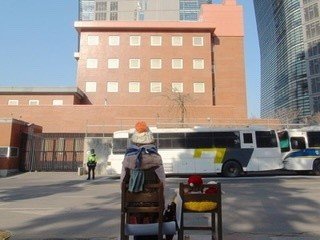
The Korea-Japan ‘Comfort Women’ Failure: A Question of History
日韓「慰安婦問題解決」の失敗:歴史問題
South Korea does not allow for any nuance in its discussions of this particular historical issue.
殊(こと)この歴史問題の議論にはどんなニュアンスも許さない韓国
by Joseph Yi, associate professor of political science at Hanyang University, Seoul
ジョセフ・イ 京城漢陽大學校政治学部准教授
https://thediplomat.com/2017/02/the-korea-japan-comfort-women-failure-a-question-of-history/
[米国ワシントンを拠点とするthe Diplomat誌(アジア太平洋地域の外交問題で評価の高い雑誌です)に掲載された、韓国人政治学者によるバイアスを排除したニュートラルな視点で書かれた慰安婦問題です。]
In December 2015, Japan and South Korea signed a landmark agreement over Japan’s wartime sexual exploitation of Korean women (“comfort women”). Japan apologized and contributed 1 billion yen (approximately $8.3 million) to compensate the survivors or their families. In return, Korea would consider the issue settled and dialogue with civic groups to remove a comfort woman statue in front of the Japanese embassy in Seoul.
2015年12月、日本と韓国は、日本による戦時中の韓国人女性(「慰安婦」)の性的搾取をめぐる画期的な合意に署名した。日本は謝罪し、10億円(約830万ドル)を拠出して生存者またはその家族に補償した。その見返りとして、韓国は問題は解決したと考え、ソウルの日本大使館前にある慰安婦像を撤去するために市民団体と対話するとしていた。

(写真)日本大使館に向かって設置された慰安婦像
However, the agreement has received low public support and fierce resistance in Korea. On December 28, 2016, protesters placed a new comfort woman statue outside the Japanese consulate in Busan. Japan responded by temporarily withdrawing its ambassador and consul general and suspending Korea-Japan talks on currency swaps and other non-security issues.
しかし、この合意は韓国では国民の支持が低く、猛烈な抵抗を受けている。2016年12月28日、釜山の日本領事館の前に抗議団体が新たな慰安婦像を設置した。これに対して日本は、大使と総領事を一時的に引き揚げ、通貨スワップなど安全保障以外の問題で韓日協議を中断するなどの対応をした。
The failure is attributed to various factors, but the key is that the two governments agreed on the solution (i.e., apology and compensation), without basic agreement on the root causes (i.e. what Japan is apologizing for). Korea claims that young women and girls were forced against their will to work as sex slaves, whereas Japan cites lack of evidence that its military forcibly recruited Korean women. Japan apologized and compensated for the general suffering of the comfort women, but not for the specific act of forcible enslavement. Until this happens, Korean protesters consider any apology incomplete.
今回の失敗には様々な要因があるが、重要なのは、根本的な原因(日本が何を謝罪しているのか)についての基本的な合意がないまま、両政府が解決策(謝罪と賠償)で合意したことだ。韓国は、若い女性や少女が自分の意思に反して性奴隷として働かされたと主張しているが、日本は軍が韓国女性を強制的に勧誘したという証拠がないことを挙げている。日本は慰安婦の包括的苦痛については謝罪と賠償をしたが、強制的な奴隷化という具体的な行為については謝罪していない。それが実現するまでは、韓国の抗議者たちはどんな謝罪も不完全であると考えている。
The gulf in historical understanding between Korea and Japan frustrates American policymakers. It also poses a puzzle for political theorists who predict cooperation among liberal democracies. To explain this puzzle, I discuss two competing approaches to history.
韓国と日本の間にある歴史的理解の溝は、アメリカの政策担当者を苛立たせている。また、自由民主主義国家間の協力を予測する政治理論家にとってもこの溝は謎である。この不可解な謎を説明するために、歴史に対する二つの対立する考え方を取り上げようと思う。

アメリカ第一号の慰安婦の碑(2010年10月New Jersey, Palisades park内に設置された)
The first is the liberal academic tradition, which valorizes the autonomy of individuals to research and to publicize their findings. History is rarely a simple conflict of good and evil, and vigorous, open debate contributes to understanding and reconciliation. The liberal approach contributes to nuanced understanding of the past, such as between Japan and the United States and Japan and its former colony Taiwan. French and German scholars have gone a step further, with a joint history textbook.
一つは個人が研究をし、その成果を公表する自律性を重視する自由学問主義的アプローチである。歴史というものが善と悪の単純な対立であることは稀であり、活発で開かれた議論により理解と和解がよりスムーズにもたらされるという考えだ。リベラルなアプローチは、日米間や日本と旧植民地台湾のように、微妙に食い違う歴史の相互理解に貢献している。フランスとドイツの学者は、共同で歴史の教科書を作成し、両国間の和合は大きく進んだ。
An alternative approach sees history as a dichotomous conflict between good and evil, and demands conformity to this truth. The Chinese government, for example, dramatizes the wartime depredations of the Japanese military and ignores acts of Chinese aggression against others (e.g. the 1950 occupation of Tibet) or against its own citizens (the 1989 Tiananmen protesters). The historical narrative shapes historical fact. For example, China proclaims that 300,000 people were killed in the 1937 Nanjing Massacre, and this historical truth is not publicly disputed by any mainland scholar. Japan replies that it is “difficult to determine the concrete number of victims,” and historians outside of China offer various estimates, from tens of thousands up to 200,000.
もう一つの考え方は、歴史を善と悪の二項対立として捉え、この(一方が100%悪いという)事実への追従を求めるものである。例えば、中国政府は、戦時中の日本軍の残虐行為は劇的に脚色しながら、他国に対する中国の侵略行為(例えば、1950年のチベット占領)や自国民に対する攻撃(1989年の天安門事件)を無視している。歴史的な物語こそが歴史的事実を形成するのだ。例えば、中国は1937年の南京大虐殺で30万人が殺されたと宣言しているが、この歴史的事実は、中国本土の学者によって公に議論されたわけではない。日本は「具体的な犠牲者数を確定するのは難しい」と答えているが、中国外の歴史家は数万人から20万人まで様々な推計を提示している。
Japan also has a longstanding tradition of viewing itself as a victim of hostile powers, such as white Westerners in the early 20th century and communist China today. But this Manichean tradition is vigorously opposed by Japanese liberal and left-wing academics, journalists, and civic groups, who research and publicly debate the country’s war record.
日本にもまた、20世紀初頭の白人欧米人や、今日の共産主義中国のような敵対勢力の犠牲者として自らを見る観点が存在した。だが、日本の場合この二元論の慣わしは、日本の戦争記録を研究しその議論を公に提示する自国のリベラル派や左翼の学者、ジャーナリスト、市民団体によって強く反対されている。
South Korea’s path to liberalization has started more recently, including the transition to a civilian-dominated government in 1992. Some academics and media vigorously challenge the older, militarist narrative of heroic South Korea and the United States, by highlighting early popular support for the North Korean regime and American massacres of Korean civilians. However, one narrative remains unchallenged:that of Japanese enslavement of Korean women.
韓国の自由への道は、1992年の文民支配政府への移行など、最近になって始まったものだ。一部の学者やメディアは、北朝鮮政権への、当初の民衆による支持や、アメリカによる韓国民間人の虐殺を強調することで、昔の軍国主義的な韓国とアメリカの英雄的物語に対し強く反発している。しかし、1つだけ、誰一人反発しない物語がある。日本による韓国人女性の奴隷化である。
In the 2016 movie Spirits’ Homecoming (귀향), Korean girls are kidnapped, abused, and killed, their bodies burned (to destroy evidence) by Japanese soldiers. In making the film, director Cho Jung-rae relied on the oral testimony of one comfort woman and cast Korean actors to portray Japanese; he did not cast Japanese actors or seek corroborating evidence from other survivors. Homecoming was widely praised in Korea and received the 21st Chunsa Film Art Awards for most popular film.
2016年に公開された映画『霊魂の帰還』(귀향)では、韓国人女性が誘拐され、虐待され、殺され、その遺体は日本兵によって焼却(証拠隠滅のため)されている。チョ・ジョンレ監督はこの映画の制作にあたり、1人の慰安婦の口述証言に頼り、日本人を演じるために韓国人俳優をキャスティングしたが、日本人俳優をキャスティングしたり、他の生存者に証拠の裏付けを求めたりはしなかった。『帰郷』は韓国で広く賞賛され、第21回チュンサ映画芸術賞で最も人気のある映画賞を受賞した。
The Homecoming-style narrative (e.g., kidnapping, enslavement, and murder) is disputed by academics elsewhere. According to San Francisco State Professor Sarah Soh (author of the book The Comfort Women), women initially offered various explanations for working at comfort stations, such as supporting their families economically or escaping overbearing parents. Some women suffered abuse; others experienced more supportive conditions. Soh argues that all the women should freely share their experiences, without pressure to conform to the nationalist, anti-Japan narrative. She gives voice to the many types of comfort women, including the 61 who accepted the 1994 Asian Women’s Fund and were therefore branded traitors by activists.
『帰郷』スタイルの物語(例:誘拐、奴隷化、殺人)は、韓国以外の世界では、学者たちに議論されている。サンフランシスコ州立大学のサラ・ソウ教授(『慰安婦』の著者)によると、女性たちは当初、家族を経済的に支えたり、威圧的な両親から逃れるためなど、慰安所で働くために様々な説明をしていたという。慰安所で虐待を受けた女性もいたし、また支援的対応を受けた女性もいた。ソウ教授は、すべての女性が、国家主義的、反日的なナラティブ(物語)に合わせるよう圧力をかけられることなく、自分たちの経験を自由に分かち合うべきだと主張している。彼女は、1994年のアジア女性基金を受け入れた61人の慰安婦を含め、様々なタイプの慰安婦の声を伝えている。
Soh remains largely unknown among Koreans, because no publisher has translated her English-language book. In 2013, Sejong University professor Park Yu-ha published a Korean-language book (Comfort Women of the Empire) with findings broadly similar to Soh’s. A Seoul court partially censored Park’s book and fined her 90 million won ($74,000) for defaming survivors of enslavement. Prosecutors also requested a three-year jail sentence. The censorship extends to foreign academics as well. One foreign professor discussed the Soh book in courses on domestic and international politics. In December 2016, some student activists reported this to the student government and the media. The professor had his job contract suspended as the university investigated claims that he supported Japanese war crimes.
ソウ教授の英語の本は韓国語に翻訳した出版社がないため、韓国人の間ではまだほとんど知られていない。が、2013年に『帝国の慰安婦』という韓国語の本を出版した世宗大学のパク・ユハ教授の場合は違った。ソウルの裁判所はパク教授の著書の一部を検閲し、奴隷制度の生存者を誹謗中傷したとして9000万ウォン(約7万4000円)の罰金を科した。検察はさらに3年間の懲役刑を要求した。検閲は外国の学者にまで及んでいる。ある外国人教授は、国内政治や国際政治の授業の中で、ソウ氏の本について議論した。すると2016年12月、一部の学生活動家が学生自治会やメディアに報告した。大学が日本の戦争犯罪を支持している、との主張を調査する間、教授は職務停止処分を受けた。
If professors are punished for publishing or even discussing contrary findings on the comfort women issue, this limits academic freedom and democratic debate. Asia is increasingly divided between the forces of individual liberty and of nationalist conformity. The continuing trial of Professor Park Yu-ha will help shape South Korea’s future path.
教授が慰安婦問題で合致しない調査結果を公表したり、議論したりすることすら罰せられれば、学問の自由や民主的な議論は制限されてしまうことになる。アジアは、個人の自由を求める勢力と国家適合主義の勢力の間でますます分裂している。現在係争が続いているパク・ユハ教授の裁判が、韓国の将来の道をかたち作る一助となると思っている。
(2017年2月8日掲載)
❇︎文中画像は本記事とは関係ありません。
(了)
